A Safe Harbor From Drugs and Violence
Recife is a beautiful city in northeastern Brazil. Known as the “Brazilian Venice,” it was founded in 1537 by the Portuguese and was greatly influenced by the Jews and Dutch. The Atlantic Ocean bathes its beautiful beaches, and the temperature can exceed 104 degrees Fahrenheit.
Foreigners and Brazilians go to Recife to travel and to rest. But hidden behind the great avenues and beautiful places is another Recife: the Recife of violence and drugs, with broken families because of the troubles that drugs bring together; the Recife of gunfire that scares children and kills innocents.
“I still have no emotional structure to even listen to fireworks,” says Adriana, director of Centro de Desenvolvimento Integral Vida 1, which lost an employee to murder last year, a victim of a gang war. “There was so much shooting, so much shooting!”
The employee’s name was Alexandre, and he was killed as he was leaving the center to exchange a crate of soda. A drug dealer suddenly grabbed Alexandre and to protect himself from gunfire coming from another drug dealer. It was urban warfare, and an innocent died.
Inside the center, the children could hear the shooting and were scared and started crying. They lay on the floor in fear after the gunfire began.
“It was a terrible time. It was difficult to explain to the children that God was in control. We lost a friend. Alexandre was loved by the children.”
If losing a beloved teacher is traumatic, imagine when a child sees his mother being arrested by the police?
Compassion Alumna Now Serving the Poor With Compassion
After learning that his wife was expecting a second child, Giovanna’s father became angry and asked her to have an abortion. But the young mother decided to have her baby. She found out that her husband had another woman and already had children with her, so Giovanna’s mother kicked her husband out of the house.
The father did not care about supporting his two children. So after Giovanna was born, her mother worked hard to support the children by herself. The family lived in a precarious house made of matting, cardboard and plastic. When her mother learned about Compassion, she registered her children.
But Giovanna’s father liked to drink alcohol. Whenever he was drunk his partner kicked him out of the house, and he would go to visit his wife only to have sex. He became aggressive if nobody opened the door. He did not care about the two scared children watching.
After some time Giovanna’s mother was expecting a third child. She decided to leave the house and go to some other place in order to stop the family violence and the sad consequences of her husband’s behavior. For example, two children at the child development center had the same last name as Giovanna; they were her half brothers.
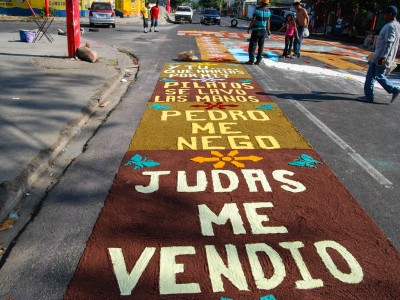
Easter in El Salvador
Easter Week in El Salvador is celebrated differently than the way it is celebrated in the United States. In the United States, Easter often includes the Easter Bunny and egg hunts. In El Salvador as well as many other Central American countries, it is celebrated with a much different atmosphere.
Easter feels like summer. The sun shines strong in the skies, the breeze somehow fresh, somehow warm. It is definitely the middle of the dry season in El Salvador, the equivalent of summer in northern lands. Everything around, from sale signs to music, talks about sun and sand. The opportunity to enjoy beaches that are just an hour away from San Salvador is almost here.
For a full week, students are out of school and have the opportunity to enjoy beaches, visit relatives and do nothing; it is almost the equivalent to spring break in the United States. However, there is one unequivocal characteristic that reminds every Salvadoran that it is not just a break, and that there is more than just sun and fun waiting for us during that week in April.
In El Salvador, the week of Easter is Holy Week, and the festivities revolve around Roman Catholic tradition. Roman Catholics account for nearly 60 percent of the population. Protestant (also called evangelical) churches account for slightly more than 20 percent.
Even though El Salvador does not have an official religion, since the time of colonization Roman Catholic traditions have been the most common and most practiced in the country. Easter Week is the most important celebration for the Roman Catholic Church.
“It is slightly different for the Protestant Church” says Sister Wendy, wife of Pastor Rodolfo at the Baptist Tabernacle Church of Majucla. “For most of the children, Easter Week is an opportunity to spend time with their families. People take advantage of this time to go back to their homeland and spend time with their families.”
One of the most important Easter traditions in El Salvador is Lent. During this 40-day period before Easter, named “Cuaresma” in Spanish, people fast, pray and give alms. The last week of the 40 days is called “Bigger Week” or “Holy Week.”
On Good Friday, there are two major processions. Early in the morning there is the “passion,” which is the representation or commemoration of the walk that Jesus took with the cross toward Golgotha. It is finished around noon.
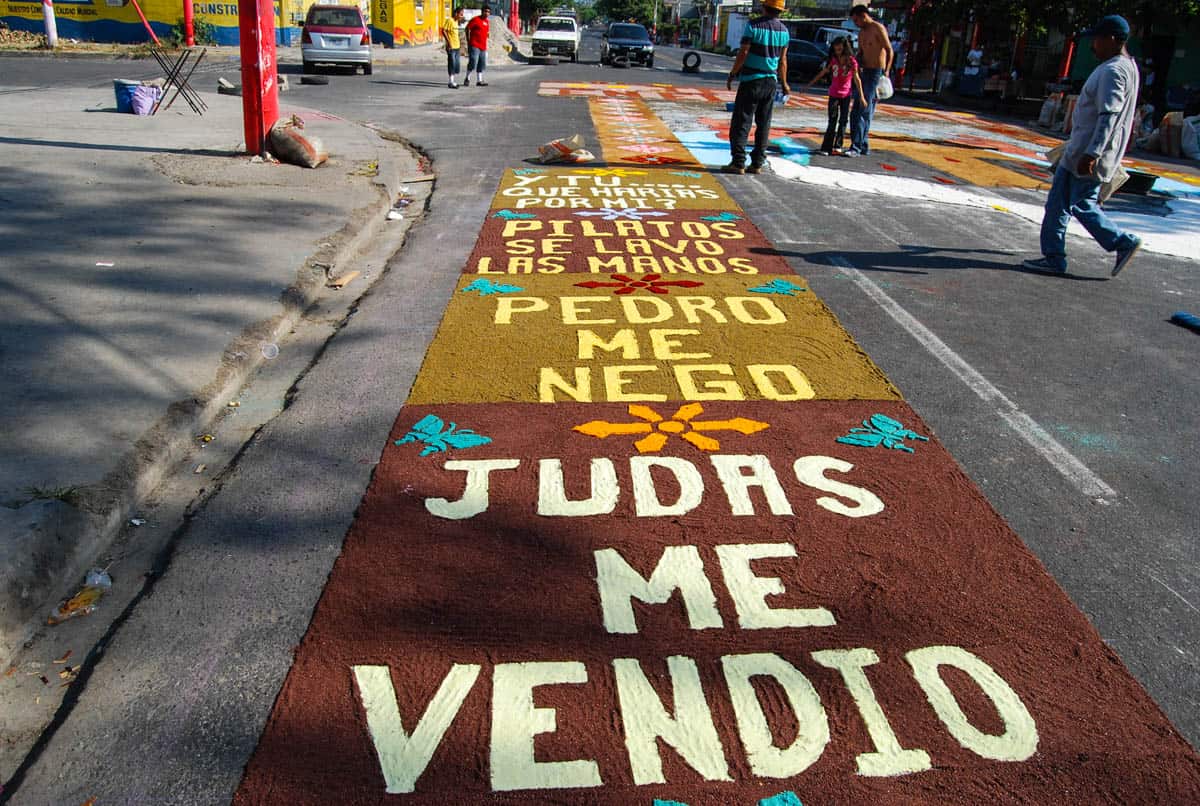
Then in the afternoon, Roman Catholic churches and communities start making rugs on the streets with sawdust, which will later be part of the path where the “holy funeral procession” will pass, carrying the symbolic dead body of Christ.
The making of these rugs represents one of the greatest traditions for the Roman Catholic Church in El Salvador, since entire streets and main avenues in many places of the country are completely closed. The rugs cover entire streets.
Appreciation of the rugs goes beyond religion. For Salvadorans, it is about appreciating the art and about appreciating the effort the people put into making the rugs. For Salvadorans, it is a gift, an offering they are making for Jesus.
Catholic or not, Salvadorans go out into the streets on Good Friday to see the rugs. Apart from this tradition for Good Friday, Holy Week develops differently for Protestants.
For the Evangelical Church in El Salvador, Holy Week is an opportunity to spread the Gospel to as many people as possible. If there is the opportunity to preach the Gospel and carry more people to the feet of our Lord, the church takes advantage of it and tells El Salvador the true meaning of Holy Week.
Leading God’s Ministry of Light
Of the thousands of villages in Indonesia, nearly 20 percent remain dark, unreached by electricity. Though sources of energy such as rivers are plentiful and accessible, they remain untouched by technology and have not yet been tapped as electricity sources.
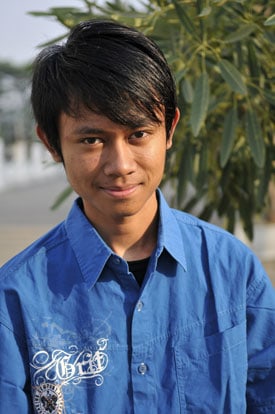 With a university major in electrical engineering, Ronny has a big dream to minister to the poor. He believes that providing electricity is one strategic way to help eradicate poverty in Indonesia.
With a university major in electrical engineering, Ronny has a big dream to minister to the poor. He believes that providing electricity is one strategic way to help eradicate poverty in Indonesia.
“I want to help the poor people in Papua villages by providing them hydro-energy technology. They have the resources everywhere; now they need the expertise, technology and people who are willing to go there.”
Ronny considers studying and learning more about hydro energy and other power sources a calling. He has a dream to develop more hydro potential in eastern Indonesia, an area known for its severe poverty, widespread undeveloped areas and lack of human resources.
“When I was going through my transition into the Leadership Development Program, I asked God ‘Why was I here? What was my purpose?’ Surely it wasn’t just to be in the best university in the country. There has to be more to this life than that.”
The Institute of Technology in Bandung (ITB) is among the best technical schools in Indonesia. Only the smartest students are able to enroll. Applicants have to pass a competitive national exam, and the school selects only the best candidates as students. Ronny is the first Leadership Development Program student to enroll in ITB.
Though Ronny’s campus graduates around 15 electrical engineers per year, this number is still low compared with the country’s need for more than 700 electrical engineers every year.
Ronny realizes his country is in an energy crisis. The electricity shortage in Java and Sumatra has confirmed the problem. He hopes he will take part in resolving the energy crisis in his country when he graduates.
“If I wish to change my country, I wish I could be a Minister of Technology and Innovation, who will make a decree and order every university and campus to open their doors for more innovation and research for technology. I would urge them to apply it accordingly to the undeveloped areas in Indonesia.”
Right now Ronny will focus on studying hard and equipping himself with the skills and knowledge needed for the future.
Ronny will graduate in two years. He will then embark on a journey to fulfill his dream of shedding light on Indonesia’s electricity crisis.
“The good part about being in the Leadership Development Program is being able to help people. The hard part is every day you have to keep your focus and realize that you are in constant spiritual battle because that is what God calls me to be in this world — to be God’s minister.”
Overcoming Racism in Colombia … in Jesus’ Name
Africans were first brought to Colombia to work as slaves during the colonial period of the 1500s. Many of their descendants still live in communities around Colombia. Although slavery was abolished in 1851, the Afro-Colombian community still faces much discrimination.
Jailer is a descendent of those slaves. He’s from Buenaventura, a port city on the coast of Colombia where most of the population is of African descent.
Buenaventura is a dangerous place for children to grow up. Many children experience abuse and violence within their families, which eventually leads them to lock their heart into an unbreakable shell to protect themselves. Many spend more and more time in the streets in an attempt to escape from reality, learning that only the tough survive.
As a child Jailer watched as this environment destroyed the dreams of his companions, who were seduced by the easy path and ended up robbing or killing at a young age, trapped in a lifestyle that’s not easy to leave.
Music as an Instrument to Release Children From Poverty
Music has long played an important part in Indonesian culture. The Indonesian jofa is one of the most common traditional instruments and it is used in every occasion or celebration.
In Watuliney, a small village in southeast Minahasa, Indonesia, most of the people love music. Those who are able to play the jofa also like to teach it to their children to perpetuate the musical tradition, but that opportunity does not come to all children. Most schools don’t provide a program for music. The parents who work as farmers can’t afford to buy the instruments for their children or to pay for the music course.
Because of his passion to preserve traditional culture, Adri, the coordinator of Silo Student Center, proposed to provide the jofa for children at the center. He believed that the children in his center had the talent and willingness to learn music.
After receiving a positive response from the church, Adri immediately checked the price of a jofa and ordered some made from a substitute material.
“We changed the material to plastic pipe. We call it jofa. Jofa is the basic instrument that has same tone as the original clarinet.”
There Is Power in Sponsor Letters … in Your Letters
At some point, everyone feels like God has left them. Yunita, one of the youngest translators for Compassion Indonesia, felt as though she had been abandoned by God until she read the words of a sponsor.
How Can Christian Child Sponsorship Influence a Country’s Politics?
The 1994 genocide destroyed Rwanda’s fragile economic base, severely impoverished the population, particularly women and children, and eroded the country’s ability to attract private and external investment. However, Rwanda has made significant progress in stabilizing and rehabilitating its economy since then.
Continued growth in this area depends on the maintenance of international aid levels, the strengthening of world prices of coffee and tea, and on having strong future leaders with good character — something Compassion Rwanda is in the forefront of helping develop.
In a recent interview, Pastor Matthias, parish priest of Gahanga Anglican Church, expressed his views on how sponsorship can influence the political arena of his country.
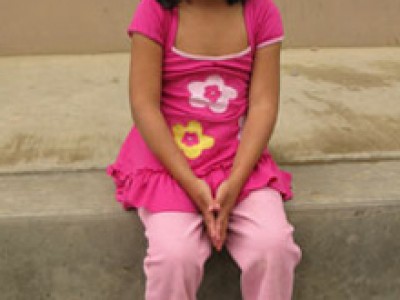
Why Children Leave Compassion International’s Child Sponsorship Program
At only 5 years of age, Michelle had to say goodbye to one of the places she loves the most: her child development center.
Introducing a Future Minister of Defense for Burkina Faso
Twelve-year-old Fadilatou is one of the top five scholars of her age in all of Burkina Faso. She is the youngest child of the family, with six brothers and sisters. Because of her parents’ hospitality, they have received some of their nephews and nieces, along with their children, so the total number of people in the family is 23.
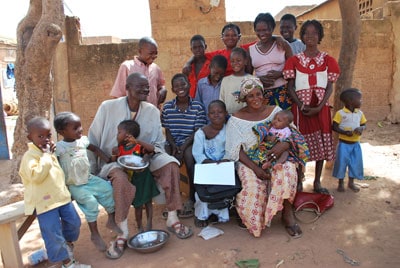
Fadilatou’s father was a driver, but is now too old to work, so he stays at home all day taking care of his grandchildren.
Her mother is a hairdresser and provides food for all the family with her income of less than $2 a day. Sometimes the mother goes to bed without eating, so the rest of the family can share the little food she has gathered.
In 2004 Fadilatou enrolled at the Assemblies of God Patte d’Oie Child Development Center. Her father was not for it because he did not know about the ministry of Compassion, but her mother insisted and convinced him to allow the girl to be part of the program.
Since she joined, Fadilatou has been the top pupil in class. She dreams of going to a military academy next year. “I would like to become minister of defense of the country,” Fadilatou tells her parents.
People Living With HIV or AIDS
Sitting in the humid air inside a tent, listening to the palm leaves sway and the support poles creak, and with her hand clasped on her cheek, Zainabu can still hear the words ringing in her head:
“You have been tested positive for human immunodeficiency virus (HIV), the micro-organism that causes the acquired immunodeficiency syndrome (AIDS).”
When the doctor announced the results, a mood of gloom and despair descended on Zainabu. She did not know where to go or what to do.
“It seemed like my life and the livelihood of my children had been cut, since they all depended on me.”
Looking for a shoulder to cry on, Zainabu wondered whom to inform or talk to. Her family and the community had no place for HIV-positive people. “I am an abomination,” Zainabu thought to herself.
Vallarasu the Outlier
NOTE FROM EDITOR: This content honors Compassion’s historical work in India. While we no longer have an India sponsorship program, we are grateful for the lives changed and meaningful work achieved through our sponsors and donors in our nearly 50 years there. For a detailed explanation of the end of our sponsorship program in India, please visit: compassion.com/india-update.
Outliers are men and women who do things out of the ordinary; men and women who have drive, skill and talent, but who also are given an opportunity to succeed.
“When outliers become outliers it is not just because of their own efforts. It’s because of the contributions of lots of different people and lots of different circumstances.” – Malcolm Gladwell
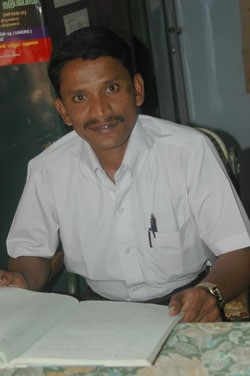 Vallarasu is an outlier.
Vallarasu is an outlier.
Vallarasu hails from Srivalliputhur. He is now 30 years old. Though his physique suggests that he is very soft guy, his words are weighty and powerful. There is a passionate boldness in his face.
Vallarasu’s dad was a shopkeeper and sold household goods. When Vallarasu was 6 years old, his father was murdered by a gang. Thereafter, the family suffered greatly. They had no money to afford even one square meal a day.
One year after the murder, Vallarasu’s mother committed suicide, and Vallarasu and his two sisters were left orphans. His two sisters were brought up by an uncle, but Vallarasu was left behind in the streets.
Compassion found him in the streets, and he was taken into St. Andrews Child Development Center. The center supported him so he could study in the school. The school had a hostel facility, so the center provided him with not only education, but also gave him shelter, food and comfort.
The problems that Vallarasu experienced as a little child instilled a deep burden within his heart. He developed a burning desire to help orphans and desolate children. He took the initiative in solving every little conflict that arose among the children at St. Andrews, and even teachers marveled at his efficiency.
Some teachers commented, “In the future, you will become a big leader in the society.” While others said, “I am sure you will stand as an advocate speaking for thousands in days to come.”


